Domestic violence is a pervasive issue that affects individuals across the world. Unfortunately, many people suffering from domestic violence do not fully understand their legal rights or how the law can protect them. If you are facing such challenges or are seeking information for someone you know, understanding domestic violence laws and your rights under the law can be life-changing.
In this blog, we will explore the essential aspects of domestic violence laws and how individuals can assert their legal rights to protect themselves from abuse. The content is carefully structured to be informative and educational, ensuring that it provides clarity on the subject matter without leading to any legal complications.
What is Domestic Violence?
Domestic violence refers to any pattern of abusive behavior used by one partner to maintain control over another partner in an intimate relationship. This abuse can take many forms, including physical, emotional, psychological, financial, and sexual abuse. It’s not limited to just married couples but can occur in relationships involving live-in partners, ex-spouses, or family members.
Types of Domestic Violence:
- Physical Abuse: Hitting, slapping, kicking, or any form of physical harm.
- Emotional Abuse: Manipulating, humiliating, or controlling a person mentally or emotionally.
- Sexual Abuse: Any non-consensual sexual acts or coercion.
- Financial Abuse: Controlling or withholding money to gain power over the victim.
- Psychological Abuse: Threatening behavior, intimidation, or isolating the victim.
The Legal Framework of Domestic Violence
Each country has laws that address domestic violence, though the specifics may vary. In many countries, domestic violence laws are designed to protect victims by providing them with the means to secure immediate relief, often through orders of protection or restraining orders, and to penalize abusers. These laws also provide avenues for victims to seek justice and hold perpetrators accountable.
For example, in India, the Protection of Women from Domestic Violence Act (PWDVA), 2005 was specifically enacted to address domestic violence. This law aims to offer a wide range of legal protection and relief for women who are victims of domestic abuse. It ensures that the legal rights of the victim are safeguarded and they have access to necessary resources, including shelter, medical assistance, and more.
Key Legal Rights of Domestic Violence Victims
If you are a victim of domestic violence, you have several legal rights that you can assert in order to protect yourself. Here are some of the most critical ones:
- Right to Protection Orders One of the most important legal rights is the ability to file for protection orders or restraining orders against the abuser. These orders can prevent the abuser from contacting you or coming near you, your children, or your property.In India, under the Protection of Women from Domestic Violence Act (PWDVA), you can apply for an order of protection from the court. The court can issue a temporary order that can become permanent, ensuring your safety and peace of mind.
- Right to Residence If you are facing domestic violence in your home, you have the right to reside in the shared household, even if it is owned by the abuser. The law ensures that you cannot be evicted from your own home due to the abuse.
- Right to Monetary Relief Victims of domestic violence are entitled to financial support for themselves and their children. This includes:
- Compensation for medical expenses.
- Maintenance for daily living and legal fees.
- Compensation for any physical or emotional injury caused by the abuser.
- Right to Child Custody If the victim has children, the law allows them to seek custody of their children, ensuring that the children are safe from the abusive parent. The safety and well-being of the children are of primary concern, and the courts will consider their best interests in custody decisions.
- Right to Legal Assistance Victims of domestic violence have the right to legal assistance. Many jurisdictions provide free legal aid to victims who are unable to afford legal counsel. Legal professionals can help you navigate the complex process of seeking a protection order, filing for divorce, or seeking custody of children.
- Right to Seek Medical Assistance Victims of physical abuse have the right to seek medical treatment for any injuries sustained during the abuse. This could include physical or psychological treatment, and any medical evidence can be crucial in court proceedings.
- Right to File a Police Report Domestic violence is a criminal offense. You have the right to report the abuse to the police. Once the abuse is reported, law enforcement authorities are obligated to investigate the matter and take appropriate action.
Steps to Take if You Are a Victim of Domestic Violence
If you find yourself in a situation of domestic violence, there are steps you can take to protect yourself and assert your legal rights.
- Reach Out for Support If you are in immediate danger, contact law enforcement or a domestic violence hotline. They can provide immediate protection and guide you on the next steps to take.
- Gather Evidence Document any incidents of abuse. Take photographs of injuries, keep records of threatening messages or behavior, and note dates, times, and details of any abusive incidents. This documentation can be important in proving your case if you seek legal protection or go to court.
- File for a Protection Order If necessary, file for a protection order from a court. This order can help ensure your safety by preventing the abuser from coming into contact with you.
- Seek Legal Assistance Consult with a family law attorney or legal aid service to understand your legal rights and options. A lawyer can help guide you through the process of seeking justice, including filing for divorce, seeking custody of children, or applying for financial support.
- Reach Out to Support Organizations Many non-profit organizations provide assistance to domestic violence victims, offering resources like shelter, counseling, legal aid, and more. Don’t hesitate to reach out for help.
How to Stay Safe During the Legal Process
While the legal process can help you secure your rights, it’s also important to take personal safety precautions during this time. Keep a safety plan in place, including a list of trusted contacts, a packed emergency bag, and a plan for where to go if you need to leave quickly.
Final Thoughts
Understanding your rights under domestic violence laws is vital for anyone who is in or has been in an abusive relationship. By taking proactive steps to secure protection, you can reclaim control over your life and move forward. However, always remember that you are not alone—there are resources available to help you navigate the legal and emotional challenges of domestic violence.




